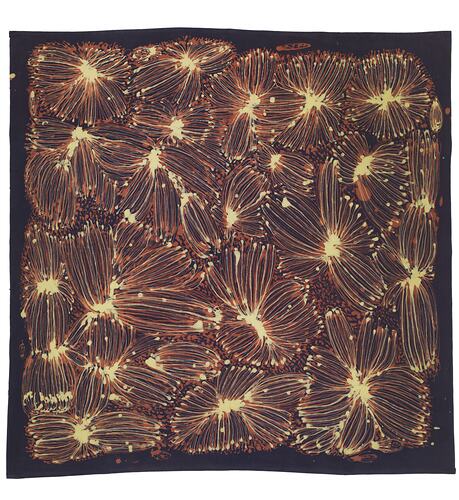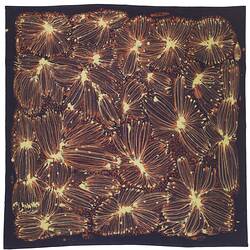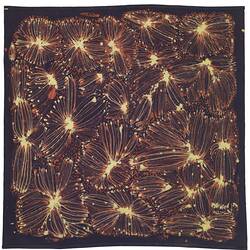Summary
Batik made by Myrtle Pitjara Petyarre during the Utopia Batik Revival Workshop in 2007. It is one of four batiks produced during this workshop which were purchased by the museum. Myrtle is an Anmatyerr woman and member of the original Utopia Women's Batik Group founded in 1978. Her batiks are colourful, distinct and feature a rawness and vivacity that was a product of the camp atmosphere and her attitude to the project.
Physical Description
Length of cotton cloth, batik. Purple, with handpainted yellow and pink floral design. The textile has been machine edged along two sides.
Significance
A set of four batiks produced during the Utopia Batik Revival Workshop in 2007 by Anmatyerra women were purchased by the museum. Audrey Ngwarai/Kngwarreye, Lena Pula/Pwerle, Myrtle Pitjara/Petyarre and Rosie Kunoth Ngwarai/Kngwarreye (Old Rosie) were members of the group who originally established the Utopia Batik Group in the 1978 with Ms Julia Murray, who co-ordinated that project for five years. The museum was in fact the first cultural institution in Australia to collect Utopia batiks from this foundational period, and those acquired in 1979 include one by the internationally acclaimed artist, the late Emily Kngwarreye. It has featured prominently in the writings about her work and has been included in a number of exhibitions, including the retrospective of Emily's work shown in Tokyo in 2007.
The batiks from 2007 provide a significant connection to the earliest works held by the museum, having been produced by the surviving members of the original Utopia Batik Group. These women are elderly and there is no arts centre or ongoing support for a batik project at Utopia, so it is unlikely any further works will be produced. These recent works done under the umbrella of the Utopia Batiks Revival Workshop Group reflect the important history of the Aboriginal arts market and homelands movement in central Australia that began in the 1970s and continues through to the present day. Homelands are under threat by the current government policies and the Northern Territory Intervention. These artists continue to seek avenues for cultural maintenance and economic support in order to sustain themselves while living on their country.
More Information
-
Object/Medium
Textile
-
Maker
-
Cultural Groups
-
Locality
-
Date Produced
-
Collector
-
Date Collected
-
Fully Extended
1087 mm (Length), 1070 mm (Width)
-
Classification
-
Date Made
-
Maker
-
Clan/Language Group
-
Place Made
-
Indigenous Region
-
Keywords
-
Type of item
-
Discipline
-
Category
-
Collecting Areas
Central and Western and South Australian Ethnographic, Australian Indigenous Identity and Contemporary Life


